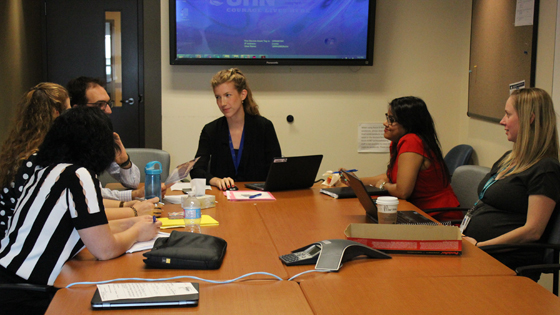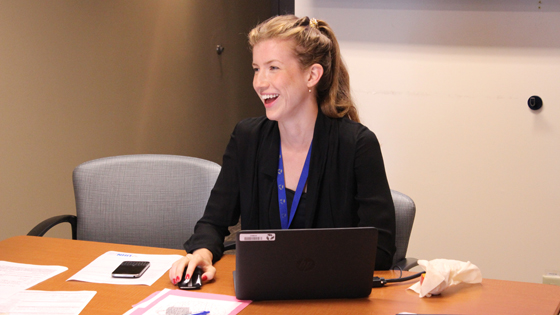
The Independence at Home Community Outreach team meets once a week to discuss patients, and which specialists are best suited to visit them based on the patients’ needs.
(Photo: UHN)
A new team based out of Toronto Rehab is working to break down barriers many older adults face when trying to access healthcare services throughout the city.
The Independence at Home Community Outreach Team was established earlier this year to connect frail older adults living in the community with the most appropriate rehabilitation, home and community support services. This is done through the development of comprehensive care plans by an interprofessional team based out of Toronto Rehab, University Health Network.
Filling a gap
The program fills what Dr. Dan Liberman, Medical Leader of Toronto Rehab's Geriatrics Program, saw as a gap in its programming.
"We have geriatrics clinics, geriatric psychiatry clinics, a falls prevention program and a geriatric day hospital, but we didn't have a program that went into peoples' homes to see how they were doing there," says Liberman.
"It became a way to tie everything together."
Related Links:
According to Dr. Liberman, going into a patient's home can also provide context he wouldn't get at an on-site visit.
"When they come to the clinic, that's just a snapshot of who they are," he says.
"When you go into their home, you can see if there's food in the fridge and how old it is, if there's clutter, if they're hoarding, or if they're taking their medications. You get a lot of information by being in somebody's home."
Patients are referred from a variety of places, including inside the hospital, family doctors, specialists, other rehab facilities and social workers. During weekly rounds, the team discusses who is best suited to make the visit based on the patient's specific needs.
Working better together
The team consists of six health care professionals: Liberman, Agnes Kulinek, the team's clinical coordinator and registered nurse, Asenath Steinman, a geriatrician, Marissa Wilson, CCAC Care Coordinator, Anna Siciliano, a social worker and Sabrina Haq, a pharmacist.

Agnes Kulinek, the team’s clinical coordinator, leads the group through the list of patients during weekly rounds. (Photo: UHN)
Kulinek says team members generally visit patients alone, or sometimes in groups of two, depending on their needs.
Even when they do go out as individuals, the team still plays an integral role in creating the best outcome for patients.
Seeing things through another's eyes
"Coming back, I'll have identified the problem, but I might not have all the solutions in my library of resources," says Kulinek.
"Bringing that information into a team setting and seeing things through each others' professional lenses allows us to problem solve together."
Having an interdisciplinary team with diverse areas of expertise also ensures the team is able to tackle the wide range of barriers older adults face on a day-to-day basis.
"As a nurse, I might have someone who needs a little bit of help with their sleep, with understanding their chronic conditions, or someone who might have a lot of medical follow-up such as bloodwork and a trip to the hospital," she says.
"But I wouldn't take on someone where we need to look at power of attorney, housing, or similar socially complex things. That would go to our awesome social worker, Anna."
At the end of the day, the team works together to ensure patients are living safely and to address any concerns they have.
"It requires collaboration, it requires creativity, it requires being aware of resources and it requires finding the most efficient and the most patient-centred way we can meet their needs," says Kulinek.
